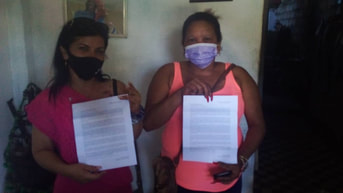|
On Monday, June 28, members of the Association of Free Yorubas of Cuba appeared at the People’s Court and Prosecutor’s Office of Placetas, Villa Clara, to file a complaint about dozens of religious freedom violations. The Free Yorubas are requesting an investigation into these violations, which are prohibited under the Cuban Constitution.  Yoruba President Donaida Perez Paseiro and member Yaimara Reyes Soler before submitting complaints. June 28, 2021. Yoruba President Donaida Perez Paseiro and member Yaimara Reyes Soler before submitting complaints. June 28, 2021. On Monday morning, Free Yorubas President Ms. Donaida Perez Paseiro along with member Ms. Yaimara Reyes Soler appeared at the Placetas Prosecutor’s office and Courthouse to submit the complaint. The Prosecutor’s office declined to accept the complaint, “because of COVID,” and directed the women to a mail drop box. Officials at the Placetas Courthouse initially met the women with resistance, but after they stood firm and insisted the document be received, the Clerk eventually accepted it. The Yorubas expect their filing will cause retaliatory action against Yoruba adherents. The Yorubas, even if we are an independent association having nothing to do with the opposition, are catalogued by the regime as opposition members. Anybody that doesn’t act in accordance with their decrees, they treat as counter-revolutionaries." “For years the Free Yorubas of Cuba – Cubans citizens – have been denied access to their own courts and dispute resolution mechanisms. Undeterred, the Yorubas succeeded today and will demand redress of their grievances in a forum on the island,” said GLA President Jason Poblete. “Discrimination is technically illegal in Cuba, yet why are the Yorubas unlawfully discriminated against by the state for their beliefs and, perhaps, on other grounds, including race? What does the Cuban legal system, or the Office of Religious Affairs, fear from the Yorubas?” added Poblete. Drafted with the assistance of a non-state lawyer in Cuba, members of the Free Yorubas allege in the complaint that their group has been erroneously designated as a political entity. They are an association of Yoruba believers. The erroneous designation has been done for political reasons. As a result, an already marginalized community in Cuban society has suffered more discrimination including being denied the right to wear garments or head coverings, as is their belief tradition. Younger members have been prohibited from entering schools because of Yoruba attire. Older members have experienced persecution in the workplace, and some have even been expelled from work centers affiliated with the state. In Cuba, it is incredibly difficult for citizens to utilize local legal remedies to resolve disputes involving the government. Often, citizens are turned away, denied entry, or paperwork is immediately thrown in the trash instead of being entered into the system. If an individual wishes to use an independent lawyer, the individual is still required to submit the paperwork directly with the court, as non-state lawyers are prohibited from advocating on behalf of others, and denied access to information. Usually it is against the law for lawyers to practice in Cuba outside the state system. To learn more about the religious persecution of the Free Yorubas of Cuba and GLA advocacy see our featured casework HERE. RELATED NEWS:
Comments are closed.
|
NewsCategories
All
|
-
About Us
- Working Groups
-
Featured Case Work
- The Cadet Newspaper at VMI
- Free Yorubas of Cuba, Regularly Attacked for Faith
- Alina Lopez-Miyares, US Citizen Tried by Cuban Tribunal
- Jamshid Sharmahd, Businessman and Broadcaster Kidnapped into Iran
- Roberto Quiñones, Jailed for Journalism
- José Daniel Ferrer and UNPACU Activists
- Rigal-Expósito Family, Torn Apart for Homeschooling
- Tejeda-Lescaille Family, Persecuted for Jewish Faith
- The Whittaker Chambers Farm
- Past Cases >
- News & Media
- Donations
- Tips


